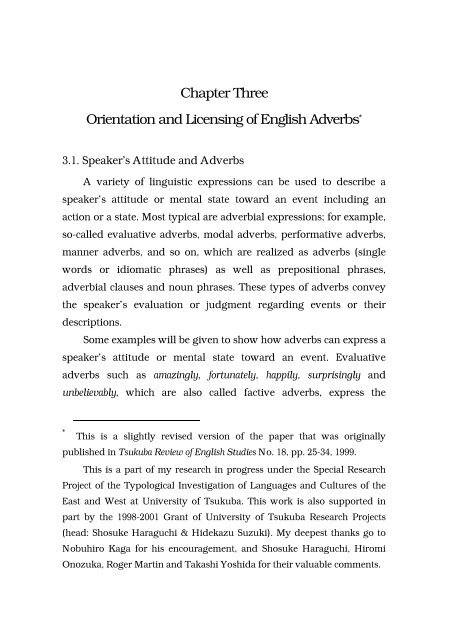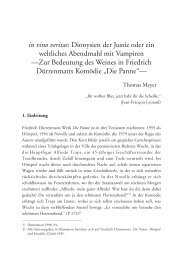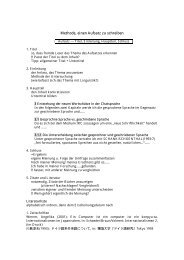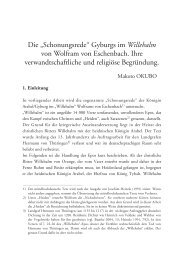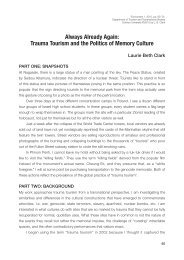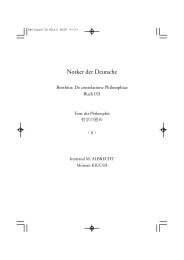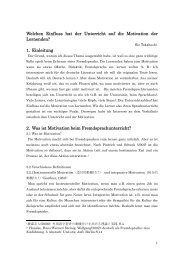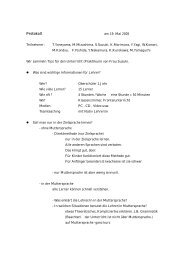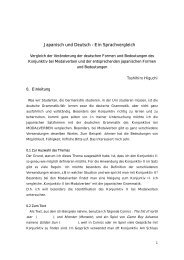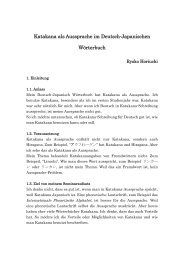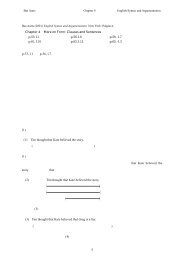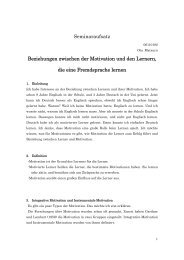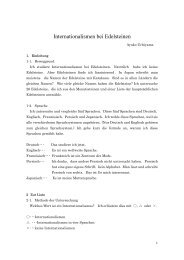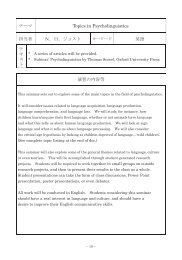Chapter Three Orientation and Licensing of English Adverbs*
Chapter Three Orientation and Licensing of English Adverbs*
Chapter Three Orientation and Licensing of English Adverbs*
You also want an ePaper? Increase the reach of your titles
YUMPU automatically turns print PDFs into web optimized ePapers that Google loves.
<strong>Chapter</strong> <strong>Three</strong><strong>Orientation</strong> <strong>and</strong> <strong>Licensing</strong> <strong>of</strong> <strong>English</strong> Adverbs *3.1. Speaker’s Attitude <strong>and</strong> AdverbsA variety <strong>of</strong> linguistic expressions can be used to describe aspeaker’s attitude or mental state toward an event including anaction or a state. Most typical are adverbial expressions; for example,so-called evaluative adverbs, modal adverbs, performative adverbs,manner adverbs, <strong>and</strong> so on, which are realized as adverbs (singlewords or idiomatic phrases) as well as prepositional phrases,adverbial clauses <strong>and</strong> noun phrases. These types <strong>of</strong> adverbs conveythe speaker’s evaluation or judgment regarding events or theirdescriptions.Some examples will be given to show how adverbs can express aspeaker’s attitude or mental state toward an event. Evaluativeadverbs such as amazingly, fortunately, happily, surprisingly <strong>and</strong>unbelievably, which are also called factive adverbs, express the*This is a slightly revised version <strong>of</strong> the paper that was originallypublished in Tsukuba Review <strong>of</strong> <strong>English</strong> Studies No. 18, pp. 25-34, 1999.This is a part <strong>of</strong> my research in progress under the Special ResearchProject <strong>of</strong> the Typological Investigation <strong>of</strong> Languages <strong>and</strong> Cultures <strong>of</strong> theEast <strong>and</strong> West at University <strong>of</strong> Tsukuba. This work is also supported inpart by the 1998-2001 Grant <strong>of</strong> University <strong>of</strong> Tsukuba Research Projects(head: Shosuke Haraguchi & Hidekazu Suzuki). My deepest thanks go toNobuhiro Kaga for his encouragement, <strong>and</strong> Shosuke Haraguchi, HiromiOnozuka, Roger Martin <strong>and</strong> Takashi Yoshida for their valuable comments.
speaker’s evaluation <strong>of</strong> an event described in a sentence whenhe/she presupposes that it is true (or that its description is true), asshown below:(1) Fortunately I never had much homework.Modal adverbs such as admittedly, certainly, possibly, presumably <strong>and</strong>probably, which are also called epistemic adverbs, express thespeaker’s estimation <strong>of</strong> probability or likelihood about the eventsdescribed, such as in the following: 1(2) Certainly, the meaning is clearer to anyone.Performative adverbs such as basically, bluntly, briefly, frankly, <strong>and</strong>generally, which are also called manner-<strong>of</strong>-speaking adverbs, are usedfor the expression <strong>of</strong> the way the speaker describes events insentences:(3) Basically, there are two approaches to the problem.Manner adverbs such as adequately, busily, carefully <strong>and</strong> slowly expresshow the speaker perceives actions in the past or present:, as shownbelow: 21Quirk et al. (1972, pp.511-520) call evaluative <strong>and</strong> modal adverbsattitudinal disjuncts, which "convey the speaker’s comment on the content<strong>of</strong> what he is saying", as clear from the name.2Cobuild Grammar gives the following definition: You <strong>of</strong>ten want to saysomething about the manner or circumstances <strong>of</strong> an event or situation. Themost common way <strong>of</strong> doing this is by using adverbs <strong>of</strong> manner. Adverbs <strong>of</strong>manner give more information about the way in which an event or actiontakes place.42
<strong>Chapter</strong> <strong>Three</strong><strong>Orientation</strong> <strong>and</strong> <strong>Licensing</strong> <strong>of</strong> <strong>English</strong> Adverbs(4) He turned back the pages very carefully.Degree adverbs such as absolutely, completely, greatly, slightly <strong>and</strong>totally, which are sometimes called intensifiers, express the speaker’sestimation <strong>of</strong> the extent or degree <strong>of</strong> the events or their resultsdescribed in sentences; the extent or degree can be seen to be eithergreater or less than usual:(5) a. Our family’s horizons were exp<strong>and</strong>ed greatly.b. Food prices actually declined slightly.Some frequency adverbs have a similar characteristic in that they canbe involved in the speaker’s estimation. Frequency adverbs can beclassified to at least two subclasses: definite frequency adverbs suchas hourly, annually, twice <strong>and</strong> three times, <strong>and</strong> indefinite frequencyadverbs such as always, generally, <strong>of</strong>ten <strong>and</strong> sometimes (Quirk et al.1985, pp. 541-550):(6) a. Most teachers announce tests once or twice.b. The idea has so <strong>of</strong>ten been mentionedThe use <strong>of</strong> indefinite frequency adverbs depends on the speaker’sestimation <strong>of</strong> how <strong>of</strong>ten the event described in a sentence was (is orwill be) repeated, which is quite different from most cases <strong>of</strong> definitefrequency adverbs.Further, there are other kinds <strong>of</strong> adverbs, such as subjectadverbs <strong>and</strong> viewpoint adverbs, which have rather complicatedfunctions. Subject adverbs, such as deliberately, intentionally, sadly <strong>and</strong>stupidly, express how the speaker feels about the subject's state <strong>of</strong>mind or intention in being in the state or doing the action which isdescribed in the sentence.43
(7) I deliberately misspelled some words.Viewpoint adverbs, such as artistically, economically, politically <strong>and</strong>technically, are used to state the point <strong>of</strong> view from which the speakerdescribes the event in the sentence.(8) Economically, the price <strong>of</strong> arms is becoming prohibitive.Viewpoint is not necessarily involved in the speaker's evaluation onan event or its description, but it clearly comes from a certain kind <strong>of</strong>the speaker's attitude with which he/she describes an event. Someconjunctive adverbs, such as accordingly, contrarily, moreover <strong>and</strong>however, can also be thought to be similar to these types <strong>of</strong> adverbs ina sense. They are used to connect the sentence in which they appearto the preceding sentence, as illustrated below:(9) Accordingly the request was grantedEven a logical connection can be made, at least in some cases, by thespeaker's judgment on how to describe an event or a series <strong>of</strong> events.These adverbs involved in the speaker’s evaluation are found tohave various kinds <strong>of</strong> functions in sentences, because the speaker canmake an evaluation or judgment on various aspects <strong>of</strong> events or theirdescriptions. For example, a conjunctive adverb is used to relate asentence in which it occurs to the sentence that it follows.Performative, evaluative <strong>and</strong> modal adverbs are associated with thewhole sentences or clauses, including embedded clauses, such ascomplement clauses <strong>and</strong> relative clauses, though the ways <strong>of</strong>association differ depending on the type <strong>of</strong> adverbs. Subject adverbsare clearly related with the subject <strong>of</strong> a sentence. Manner adverbs areassociated with actions, but they are usually used to put a focus on44
<strong>Chapter</strong> <strong>Three</strong><strong>Orientation</strong> <strong>and</strong> <strong>Licensing</strong> <strong>of</strong> <strong>English</strong> Adverbsprocesses (part <strong>of</strong> processes) <strong>and</strong> to describe them, so they are closelyrelated with the verb phrase (VP). Thus, in order to explore thefunctions or characteristics <strong>of</strong> adverbs, it is necessary to determinewhat aspect <strong>of</strong> an event the speaker evaluates <strong>and</strong> which element theadverb is associated with in a sentence.3.2. Kinds <strong>and</strong> Names <strong>of</strong> AdverbsI have referred to several kinds <strong>of</strong> adverbs: factive adverbs,modal adverbs, performative adverbs, manner adverbs, degreeadverbs, subject adverbs, viewpoint adverbs <strong>and</strong> conjunctiveadverbs. It is useful to ask what is meant by the names <strong>of</strong> the adverbswhen we try to make clear their functions or properties, eithersyntactic or semantic. Some <strong>of</strong> the names come from the (lexical orintrinsic) meanings which they express (e.g. manner, temporal,locative, degree adverbs <strong>and</strong> adverbs <strong>of</strong> means <strong>and</strong> instrument);some come from the roles or functions which they perform insentences (e.g. performative, viewpoint <strong>and</strong> conjunctive adverbs);others come from the names <strong>of</strong> the elements which they modify (e.g.subject adverbs).Let us first compare manner adverbs with performative adverbs,which can be used as follows:(10) a. The students spoke to me frankly. (manner)b. Frankly, they are not working so hard. (performative)The notion “manner” st<strong>and</strong>s for the meaning which a word canexpress, in the same way as the notions <strong>of</strong> place, time, means <strong>and</strong>instrument. Manner means “a way <strong>of</strong> doing something or the way inwhich a thing is done or happens” (American Heritage Dictionary) <strong>and</strong>manner adverbs, as mentioned above, express how the speaker45
perceives an action. It is clear that performative adverbs also expressa kind <strong>of</strong> manner. 3 The difference between these two kinds <strong>of</strong>adverbs lies in their roles or functions; that is, what element theymodify <strong>and</strong> how they do so. Manner adverbs modify the VP inwhich they appear, more specifically, “predicate verb +(which canbe null)”, while performative adverbs can be considered to modify aperformative verb which is usually not expressed explicitly butimplied in sentences. Performative adverbs have a sort <strong>of</strong>performative or illocutionary force in that they seem as if theymodify unexpressed performative verbs <strong>and</strong> compose a higherperformative predicate in a form <strong>of</strong> “performative verb +performative adverb”. Note here that performative adverbs look as ifthey modify unexpressed performative verbs as manner adverbs.Let us next consider a pair <strong>of</strong> manner adverbs <strong>and</strong> subjectadverbs, which can be used in (11):(11) a. Jim didn’t accept the award proudly. (manner)b. Proudly, Jim wouldn’t accept the award. (subject)Subject adverbs are, as mentioned above, adverbs that express thesubject's state <strong>of</strong> mind or intention in being in the state or doing theaction which is described in the sentence. There is some similaritybetween manner <strong>and</strong> subject adverbs, because the subject’s state <strong>of</strong>mind or intention is easily reflected on how actions will be done orare being done. However, these two types <strong>of</strong> adverbs are differentfrom each other in that manner adverbs express how the actions arebeing done while subject adverbs convey the subject’s state <strong>of</strong> mind3It is probable for this reason that adverbs <strong>of</strong> this kind are also calledmanner-<strong>of</strong>-speaking adverbs.46
factive adverbs, can be used to express how the speaker evaluates theevents described in a sentence, with the presupposition that theyactually happened or will happen. Then, these two kinds <strong>of</strong> adverbsare similar in that they express states <strong>of</strong> events in some cases. It isimportant to note, however, that only some evaluative adverbs canbe used as manner adverbs, which is different from the case <strong>of</strong>manner <strong>and</strong> performative adverbs as well as manner <strong>and</strong> subjectadverbs. It should be noticed here that “evaluation” represents somekind <strong>of</strong> notion, not functions <strong>of</strong> linguistic expressions, just likemanner, place, time, instrument <strong>and</strong> others, <strong>and</strong> that the term <strong>of</strong>evaluative adverb does not show how these adverbs work insentences. The class <strong>of</strong> evaluative adverbs usually consists <strong>of</strong> adverbswhich convey the speaker’s evaluation <strong>of</strong> an event <strong>and</strong> have scopeover the whole clause while manner adverbs have scope over VP.Hence evaluative adverbs are classified as sentence adverbs. 5Finally consider the case <strong>of</strong> modal adverbs, which can be used asfollows:(13) a. Probably that is a nice decision.b. Clearly there is a change <strong>of</strong> approach here.Modal adverbs are quite similar to evaluative adverbs in somerespects, especially in that the name given to these adverbs is basedon meaning, not on function. The notion <strong>of</strong> “modal” conveys thespeaker’s comment or judgement on the degree <strong>of</strong> possibility <strong>of</strong> the5Quirk et al. (1985, pp.612-631) call evaluative adverbs content disjunctsfrom the point <strong>of</strong> view <strong>of</strong> the function which they perform in sentences.This is different from Quirk et al. (1972), who call them attitudinal disjuncts,as mentioned above.48
<strong>Chapter</strong> <strong>Three</strong><strong>Orientation</strong> <strong>and</strong> <strong>Licensing</strong> <strong>of</strong> <strong>English</strong> Adverbscontent <strong>of</strong> what he/she is saying. The term “modal adverb” is usedmore specifically; modal adverbs are adverbs that express themeaning just mentioned <strong>and</strong> have scope over the whole sentence,hence they are called sentence adverbs as well as evaluative adverbs.Notice that the speaker’s comment on the modality <strong>of</strong> possibility canbe given not only to the whole sentence but also to parts <strong>of</strong> asentence. Actually, modal adverbs can be used as a modifier <strong>of</strong>adjectives <strong>and</strong> noun phrases (NPs), as shown in (14), which is alsotrue <strong>of</strong> other kinds <strong>of</strong> adverbs 6 :(14) a. This option is clearly preferable. 7b. This is a clearly preferable option.To sum up the above discussion, the names <strong>of</strong> adverbs do notnecessarily represent their uses. In fact, among the kinds <strong>of</strong> adverbsdiscussed above, only the name <strong>of</strong> “subject adverb” has to do withthe way adverbs <strong>of</strong> this class are used in a sentence while the names<strong>of</strong> the other kinds <strong>of</strong> adverbs essentially have to do with their lexicalmeaning. Then, in order to make clear the characteristics <strong>of</strong> adverbs,it is essential to know the functions <strong>of</strong> adverbs in sentences, i.e., howadverbs can be used in sentences.6For example, consider (i) below, where exactly works as a modifier <strong>of</strong> theNP.(i) This is exactly the same option that I would like to take.7The occurrence <strong>of</strong> clearly in (14a) can be ambiguous in that it can beinterpreted either as a modifier <strong>of</strong> the adjective preferable or as a sentenceadverb.49
3.3. Determining the <strong>Licensing</strong> Domain <strong>of</strong> AdverbsI have shown in Section 1 that the speaker’s attitude orevaluation can be attributed to many aspects <strong>of</strong> an event described ina sentence <strong>and</strong> that a variety <strong>of</strong> expressions conveying the speaker’sattitude can be used in sentences. Thus various kinds <strong>of</strong> adverbsinvolved with the speaker’s attitude or evaluation can be used indifferent ways in sentences. I have also discussed in Section 2 the factthat the names <strong>of</strong> most adverbs 8 do not indicate their use, hence wehave to know how particular adverbs are used in sentences.Moreover, adverbs are <strong>of</strong>ten ambiguous in function, <strong>and</strong> therefore itis necessary but not sufficient to specify that an adverb at issue isassigned to more than one class <strong>of</strong> adverbs if it has a multiplefunction; we have further to determine how it is actually used in aparticular sentence. The uses or functions <strong>of</strong> adverbs have beenexplained in terms <strong>of</strong> “orientation” in Jackend<strong>of</strong>f (1972) <strong>and</strong> “scope”in Travis (1987) <strong>and</strong> Ernst (1998).Jackend<strong>of</strong>f (1972) suggests that some adverbs such asperformative, evaluative <strong>and</strong> modal adverbs are speaker-orientedadverbs <strong>and</strong> others are subject-oriented adverbs. The notion <strong>of</strong>orientation is very useful but it must be modified slightly (see Suzuki(1979) <strong>and</strong> “Ambiguity <strong>and</strong> <strong>Orientation</strong> <strong>of</strong> <strong>English</strong> Adverbs” in thisvolume (“Fukushi-no Aimaisei to Shikosei” in Japanese) <strong>and</strong> it canbe extended further to cover other kinds <strong>of</strong> adverbs: agentiveorientedadverbs, verbal-oriented adverbs, experiencer-oriented8Except subject adverbs which modify the subject <strong>of</strong> a sentence <strong>and</strong>possibly performative adverbs which modify an unexpressed performativeverb or clause.50
<strong>Chapter</strong> <strong>Three</strong><strong>Orientation</strong> <strong>and</strong> <strong>Licensing</strong> <strong>of</strong> <strong>English</strong> Adverbsadverbs, result-oriented adverbs, complement-oriented adverbs, etc.(Platt-Platt, 1972 <strong>and</strong> Lehrer, 1975). Extension <strong>of</strong> this notion seemspromising in that it can account for how adverbs work in sentences,in particular, which element an adverb "modifies" in a sentence. It isimportant to specify the association between adverbs <strong>and</strong> theelements which they modify in order to capture co-occurrencerestriction <strong>and</strong> to account for licensing <strong>of</strong> adverbs in sentences.The notion <strong>of</strong> scope has long been used in the study <strong>of</strong> adverbs,as mentioned above. Sentence adverbs <strong>and</strong> VP adverbs areconsidered to have scope over the whole sentence <strong>and</strong> VP,respectively. Given the wide variety <strong>of</strong> functions <strong>of</strong> adverbs, it willbe useful <strong>and</strong> helpful to extend <strong>and</strong> elaborate this notion along thelines suggested by Travis (1988) <strong>and</strong> Ernst (1998), to specify rigidlywhere (or in what phrase) particular adverbs work in sentencestructures; the more rigidly the scope <strong>of</strong> a particular adverb isspecified, the more specifically its function in the sentence can bedetermined. Such extension <strong>and</strong> elaboration <strong>of</strong> the notion scope willbe needed to distinguish two uses <strong>of</strong> the adverb quite, for example, inthe expressions such as a quite difficult problem <strong>and</strong> quite a difficultproblem; in the former case, the scope <strong>of</strong> quite is an adjective (but notan adjective phrase (AP), as suggested by Travis) while in the lattercase, the scope <strong>of</strong> quite is an NP. This distinction will also be helpfulfor capturing (lexical) properties <strong>of</strong> the adverb, such as the fact that itcan be used in such an expression as quite a party but not in *a quiteparty. Similar cases can be found in larger phrases or even entiresentences. Both the notions <strong>of</strong> orientation <strong>and</strong> scope are important<strong>and</strong> useful for a study <strong>of</strong> adverbs. But orientation can be used tospecify the association between adverbs <strong>and</strong> the elements which theymodify (or are related to) while scope can be used to determine the51
egion or phrase (in any size, i.e., from a single word to an entireclause).Among the most important problems in explaining theproperties <strong>of</strong> adverbs is to account for the occurrence <strong>of</strong> adverbs insentences, including co-occurrence restriction. The first task forlicensing adverbs is to determine a scope <strong>of</strong> a particular occurrence<strong>of</strong> an adverb in a sentence. It will delimit the region in which theadverb works properly, where its orientation <strong>and</strong> co-occurrencerestrictions can be captured. The second task is to specify theorientation <strong>of</strong> the adverb <strong>and</strong> the relation between it <strong>and</strong> the elementit is oriented to. Based on this relation, relevant co-occurrencerestrictions will be checked.Finally, let us consider the sentences in (15), where the adverbsadly is used, to see how these tasks can be done (Suzuki, 1997).(15) a. The old man was sitting on the bench sadly.b. Sadly, they were walking down the street.c. Sadly, our <strong>of</strong>fer was rejected by the committee.The scope <strong>of</strong> sadly is the VP in (15a) but not the entire clause, which isdetermined by the structure <strong>and</strong> position in which it occurs. Itfollows that the determination <strong>of</strong> the scope <strong>of</strong> adverbs is subject tocertain conditions (Suzuki, 1995). Then, it will be decided that sadly isoriented to the VP was sitting on the bench. The relevant co-occurrencerestrictions are satisfied between sadly <strong>and</strong> the VP. Hence, thisoccurrence <strong>of</strong> sadly can be licensed. It is interesting to note that thescope <strong>of</strong> sadly can be both the subject <strong>and</strong> the entire clause in (15b)<strong>and</strong> (15c), owing to the position in which it appears. In the case <strong>of</strong>(15c), sadly can be licensed when it has scope over the entire clause,because it is compatible with the properties <strong>of</strong> the clause. However, it52
<strong>Chapter</strong> <strong>Three</strong><strong>Orientation</strong> <strong>and</strong> <strong>Licensing</strong> <strong>of</strong> <strong>English</strong> Adverbscannot be licensed when it has scope over the subject, because in thiscase it is oriented to the subject <strong>and</strong> it does not satisfy theco-occurrence restriction to the effect that adverbs <strong>of</strong> this kind (i.e.,subject adverbs) require an animate subject NP. On the other h<strong>and</strong>,in the case <strong>of</strong> (15b), sadly can be licensed when it is oriented either tothe entire clause or the subject, satisfying every relevant requirement,although it seems preferable to interpret it as a subject-orientedadverb.53
ReferencesErnst, T. 1998. “The Scopal Basis <strong>of</strong> Adverb <strong>Licensing</strong>,” NELS 28,pp.127-142.Jackend<strong>of</strong>f, R. 1972. Semantic Interpretation in Generative Grammar.Cambridge, MA.: MIT Press.Lehrer, A. 1975. “Complement-oriented adverbs,” Linguistic Inquiry 6,pp.489-94.Platt, J. <strong>and</strong> H. Platt. 1972. “<strong>Orientation</strong> <strong>of</strong> manner adverbials,” Papers inLinguistics 5, pp.227-49.Quirk, R., S. Greenbaum, G. Leech, <strong>and</strong> J. Svartvik. 1972. A Grammar <strong>of</strong>Contemporary <strong>English</strong>. London: Longman._______ 1985. A Comprehensive Grammar <strong>of</strong> the <strong>English</strong> Language. London:Longman.Suzuki, H. 1979. “Properties <strong>of</strong> subject adverbs,” (in Japanese) Studies inLanguages <strong>and</strong> Cultures 6, pp.15-39.________ 1983. “Modification <strong>and</strong> orientation <strong>of</strong> adverbs,” Tsukuba Review <strong>of</strong><strong>English</strong> Studies 2, pp.69-81.________ 1995. “Toward an explanation <strong>of</strong> adverbs,” Tsukuba Review <strong>of</strong><strong>English</strong> Studies 14, pp.33-47.________ 1997. “A note on adverbial-licensing mechanism,” ms. University<strong>of</strong> Tsukuba & MIT. [a slightly different Japanese version in TsukubaReview <strong>of</strong> <strong>English</strong> Studies 16, pp.37-48.]Travis, L. 1988. “The syntax <strong>of</strong> adverbs,” McGill Working Papers inLinguistics: Special Issue on Comparative Germanic Syntax. pp.280-310.54


